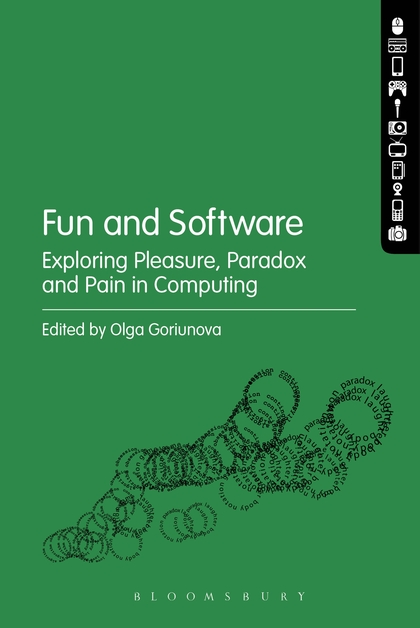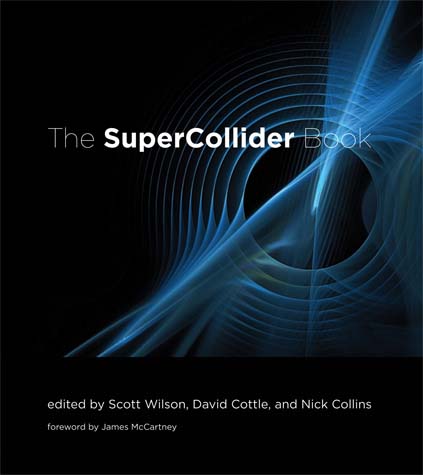Olga Goriunova (ed.): Fun and Software: Exploring Pleasure, Paradox and Pain in Computing (2014)
Filed under book | Tags: · abstraction, aesthetics, affect, algorithm, art, body, code, computing, game, humour, labour, logic, media, media theory, politics, programming, software, software art, software studies, theory, time

“Fun and Software offers the untold story of fun as constitutive of the culture and aesthetics of computing. Fun in computing is a mode of thinking, making and experiencing. It invokes and convolutes the question of rationalism and logical reason, addresses the sensibilities and experience of computation and attests to its creative drives. By exploring topics as diverse as the pleasure and pain of the programmer, geek wit, affects of play and coding as a bodily pursuit of the unique in recursive structures, Fun and Software helps construct a different point of entry to the understanding of software as culture. Fun is a form of production that touches on the foundations of formal logic and precise notation as well as rhetoric, exhibiting connections between computing and paradox, politics and aesthetics. From the formation of the discipline of programming as an outgrowth of pure mathematics to its manifestation in contemporary and contradictory forms such as gaming, data analysis and art, fun is a powerful force that continues to shape our life with software as it becomes the key mechanism of contemporary society.”
Texts by Andrew Goffey, Simon Yuill, Matthew Fuller, Luciana Parisi and M. Beatrice Fazi, Adrian Mackenzie, Michael Murtaugh, Geoff Cox and Alex McLean, Wendy Hui Kyong Chun and Andrew Lison, Christian Ulrik Andersen, Brigitte Kaltenbacher, Annet Dekker, and Olga Goriunova.
Publisher Bloomsbury, New York and London, 2014
New Media and Technology series
ISBN 1623560942, 9781623560942
285 pages
Software studies page on Monoskop
Comment (0)Stewart Brand: The Media Lab: Inventing the Future at MIT (1987)
Filed under book | Tags: · artificial intelligence, communication, computer graphics, computing, human-computer interaction, information, media, music, new media, programming, publishing, robotics, science fiction, speech, technology, television

A magical mystery tour through the world of MIT’s Media Laboratory, then headed by Nicholas Negroponte and in its third year of existence. Chapter 11 develops the dictum “information wants to be free.”
Publisher Viking, New York, 1987
ISBN 0670814423
285 pages
Review (Visual Resources, 1989)
Review (AI Magazine, Lee S. Brownston, 1990)
PDF (50 MB, updated on 2014-3-26 to an OCR’d version via Marcell Mars)
Comment (0)Scott Wilson, David Cottle, Nick Collins (eds.): The SuperCollider Book (2011)
Filed under book | Tags: · code, computer music, microsound, music, programming, software, sonification, sound, sound art, sound synthesis

“SuperCollider is one of the most important domain-specific audio programming languages, with potential applications that include real-time interaction, installations, electroacoustic pieces, generative music, and audiovisuals. The SuperCollider Book is the essential reference to this powerful and flexible language, offering students and professionals a collection of tutorials, essays, and projects. With contributions from top academics, artists, and technologists that cover topics at levels from the introductory to the specialized, it will be a valuable sourcebook both for beginners and for advanced users.
SuperCollider, first developed by James McCartney, is an accessible blend of Smalltalk, C, and further ideas from a number of programming languages. Free, open-source, cross-platform, and with a diverse and supportive developer community, it is often the first programming language sound artists and computer musicians learn. The SuperCollider Book is the long-awaited guide to the design, syntax, and use of the SuperCollider language. The first chapters offer an introduction to the basics, including a friendly tutorial for absolute beginners, providing the reader with skills that can serve as a foundation for further learning. Later chapters cover more advanced topics and particular topics in computer music, including programming, sonification, spatialization, microsound, GUIs, machine listening, alternative tunings, and non-real-time synthesis; practical applications and philosophical insigh”s from the composer’s and artist’s perspectives; and “under the hood,” developer’s-eye views of SuperCollider’s inner workings. A Web site accompanying the book offers code, links to the application itself and its source code, and a variety of third-party extras, extensions, libraries, and examples.”
Foreword by James McCartney
Publisher MIT Press, 2011
ISBN 0262232693, 9780262232692
756 pages
Review: Dave Phillips (Linux Journal).
PDF (removed on 2014-2-4 upon request of the publisher)
Code (ZIP)
Book resources (code, video examples)
Book errata

